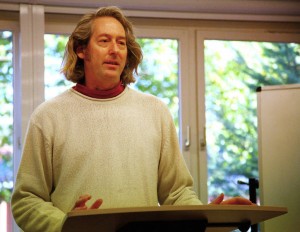
On Wednesday, the 12th of October, ECLA welcomed Jarrell Robinson as a guest lecturer on the second book of Plato’s Republic for our Core course: Plato and his Interlocutors.
Jarrell received his BA from St. John’s College and his MA from the Committee on Social Thought at the University of Chicago and has been a part of ECLA’ s community both as a professor and a guest lecturer throughout the years.
Jarrell opened the plenary session on “Book II” of the Republic by noting that there are many possible ways one can begin to read and interpret this chapter of Plato’s work. He started with the question of what the education of the guardians has to do with justice and why even though “Book II” opens with the speeches by Glaucon and Adeimantus, who demand a clear argument from Socrates as to why justice is desirable and preferable to injustice, the discussion seems to break off at the point where the question of education arises.
Jarrell asked, “Why does the conversation take a turn at that particular moment: is there an intrinsic connection between justice and education?” Although he says, “the Republic has so many turns that it is tempting to stop asking why,” there is an assertion voiced by Adeimantus that the subject of education is pertinent. Thus, Jarrell invited us to follow him in tracing that “intrinsic” thread through Plato’s development of the argument.
The speeches given by Glaucon and Adeimantus concern the issue of whether justice is a ‘good’ desirable in itself or only for its consequences (i.e. for the rewards one will reap if one acts justly), or if it can be both a ‘good’ in itself and for its effects. Jarrell described the content of the speeches as, “[the] opinions of the many said at all times and all places.” These speeches present the view of the many and in doing so show us that what is, in fact, desirable is the appearance of justice; to have a reputation; to seem just, rather than to bejust.
If human nature is left unrestrained by social conventions, it will always strive to get more or “the better of” something; it would not concern itself with justice. The Greek word for this natural ‘appetite’ is pleonexia, and as Jarrell put it: “It is not a particular desire, but rather the essence of desire itself.” The opinions presented by the two interlocutors of Socrates suggest that justice is the restraining of natural human desires, furthered in societies only for the rewards of honour, venerable reputation and the fear of suffering injustice.
If justice sholud be conceived as the natural work of the soul, Socrates has to show what makes an individual just when all the external incentives are removed. He does so by noting that justice is present both in a human being and in a city, choosing the latter as the template for his inquiry.
Socrates accepts the assumption that ‘pleonexia’ is natural and the human is insufficient by himself, so that he is constantly in need, not only of something else, but also of someone else. This is the reason why people gather together and how the “healthy city,”1 which accomplishes the basic needs of human beings, is founded.
Jarrell emphasized, however, that “this founding principle of need is itself a form of desire due to a certain lack, and although each man gives and takes, in a somewhat just way, the force of this self-interest cannot be lessened, for it emerges from a self that is defective and needs to cure itself.” Thus, ‘pleonexia’ lies hidden in this city, but steadily grows and transforms it into a “feverish”2 entity because of the individuals’ constant longing for more.
This city eventually needs to wage wars to expand its territory and accommodate this ever-growing desire for accumulation. The city needs guardians, those whose nature should be both gentle and aggressive; a philosophic nature.3
Here we come to that turning point in the conversation where Socrates and his interlocutors discuss the education of the guardians. They are needed not only as protectors or warriors, but also as individuals, who can distinguish between friend and enemy, and thus, good and evil.
This capability for distinction lies in their philosophical disposition, which is characterized by the desire for something higher in terms of value. Jarrell continued, “Their desire is directed towards the best and highest,” towards a god that is entirely good and fixed in his form; unchanging and undeceiving”.
They herald the emergence of that city, which according to Jarrell, originates not from the desire for more, but from the desire for the higher and best. The guardians serve the desires of the city, but they want and need something higher. Hence, the education of the guardians will be modeled according to that ideal fostered by the image of such a good and furthered by the intrinsic human desire for the highest and best.
We sincerely thank Jarrell for the inspiring lecture and for his truly philosophical and Socratic approach in our seminar discussions. He also took part as an interlocutor in the Ethics and Political Theory Concentration seminar, “The Individual and the Society”, and questioned our understanding of justice, leaving us with a more profound and informed approach towards investigation into the nature of justice.
[1] [2] [3] Allan Bloom, trans., The Republic of Plato (New York: Basic Books, 1968), 35–62.
by Maria Androushko (1st year BA, Bulgaria)
